The Dorris Family of Montgomery County, Mississippi
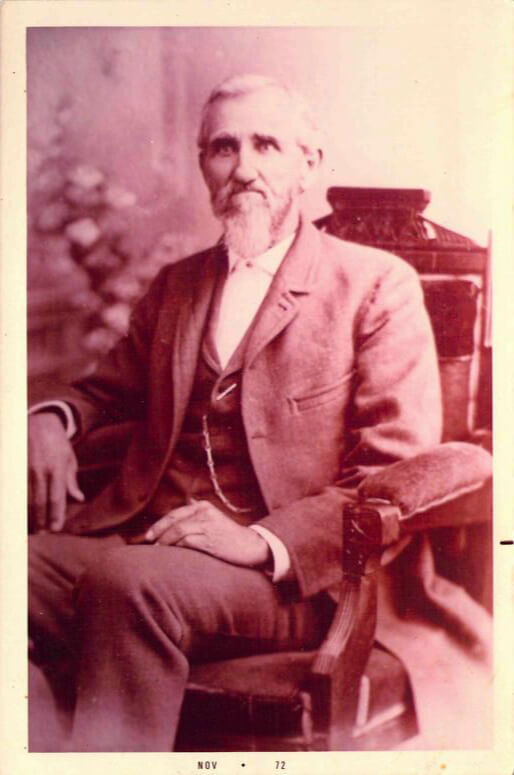

In 1842, Joseph Mitchell Dorris built a log cabin on the left side, going south, of what is now Mississippi Highway 413 about 3 miles south of Kilmichael, Mississippi. The house was built on 700 acres of farm land belonging to the Dorrises. His father, James, and his grandmother, Emily are listed in the 1840 census of Choctaw County of which the Kilmichael area was a part. Joseph Mitchell married Jane Powell, the daughter of a local planter, on February 10, 1847.
Their first of 12 children (7 boys, 5 girls), Jimmy, was born on February 4, 1848. Following Jimmy were Sarah, Marion, Alice, Harvey, Lute, Drake, Ben, Will, Bell, Gerry (a girl) and Ronnie. The last was born on March 5, 1870.
Joseph Mitchell served in the Civil War. After the war he sent Marion and Ben through Harvard Business School. Later he sent Will and Drake through Clinton College (now Mississippi College) and they were prepared as schoolteachers. These four young educated sons followed Horace Greeley’s advice and went west. By the 1880’s all four by different routes were in the desert town of Phoenix in the very hot and arid Territory of Arizona.
Marion and Drake were into the secondhand store business in Phoenix by 1881. They had only one new line of merchandise and it was the New Home Sewing Machine. Will quit teaching in Woodland, California and went to Phoenix to join his older brothers in 1888. He operated a confectionery stand in front of the Dorris brothers second location, The Dorris Bros. Furniture Co., which was located at 1822 East Washington Street in downtown Phoenix. He was a partner in the confectionery business with his older brother, Ben.
The Dorris Brothers prospered in Phoenix. This writer’s mother, Maude Watson, told him they were wealthy. In an interview with John Jaquemart of the Arizona Historical Society, in 1986, this writer was told that his mother was right. Jaquemart concluded after years of research on the Dorris Family in Phoenix that they controlled Phoenix at the turn of the century economically, socially, religiously, and politically. By that time Will owned the Dorris Cash Grocery chain of stores. Marion was president of the major bank. Drake owned the largest furniture store in Phoenix. Ben owned the confectionery business and managed the Dorris Opera House. Two daughters of Joseph were married and living in Phoenix. One’s husband had a chain of drug stores, and the other’s husband owned the ice and coal business.
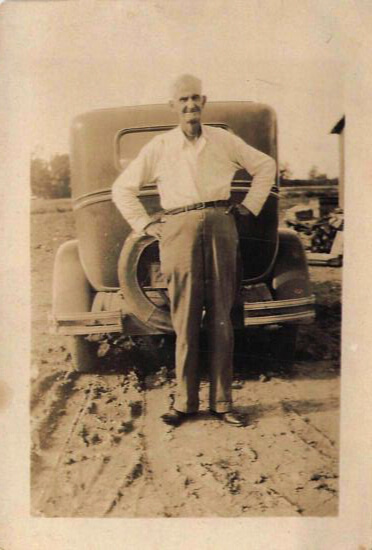

In 1889, Lute (Luther Green) another of the sons, took his family to Phoenix, pitched his tent along the canal near Camelback Mountain, and set out hundreds of acres of citrus trees in neat commercial cross rows. He used native sour orange hearty stock onto which he grafted grapefruit, lemon, satsuma, or orange prolific domestic stock. Most were grafted as orange. He was a very successful farmer and nurseryman in Mississippi, before going to Phoenix. Maude, my mother, and Lute’s daughter hated the tent life. She liked it there much better after her father moved the family into a brick home at 545 3rd Street in Phoenix.
The Arizona Historical Society justifiably credits Luther Green Dorris as having begun the citrus industry in Arizona. Many of his original trees are still living and bearing fruit among the buildings of the Camelback Mountain area. They were cut down only to accommodate the varied structures of buildings. The citizens paint the trunks white for beauty and protection against heat. And there they stand 108 years later looking pretty and bearing fruit. Yours truly has a jar of grapefruit jelly in the refrigerator made from fruit from one of those 108 year old trees.
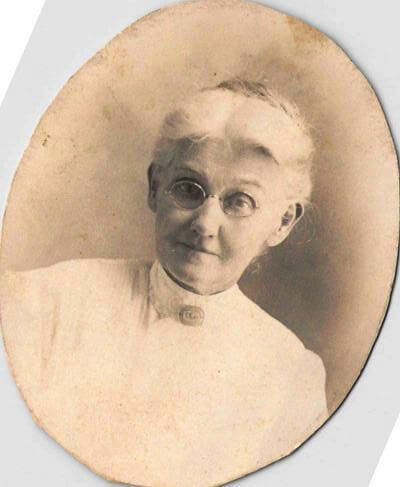
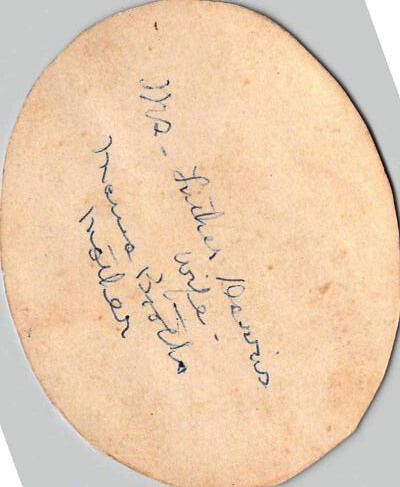
At the turn of the century eight of those Dorrises who were born in the old plantation house (Joseph Mitchell added to the log core of the house as the family grew) lived with their spouses in Phoenix. After Jane’s death in 1884, Joseph Mitchell joined his children as a Phoenix resident and home owner. Jane is buried at the Poplar Creek Nations Cemetery south of Kilmichael, Miss.
In 1910 Will bought the nearly finished Dorris-Heyman Building at the corner of First and Adams Street in central downtown Phoenix from the financially distressed builder for $165,000. It was the largest financial transaction in the city to that date. Even while completing the building, Will rented a prominent street-corner portion of the building to Senator Barry Goldwater’s father. Marion loaned Goldwater’s father the money to finance the starting of business. The Goldwater’s moved on to build the chain of Goldwater Department Stores that dominate many of the big shopping malls throughout the West.
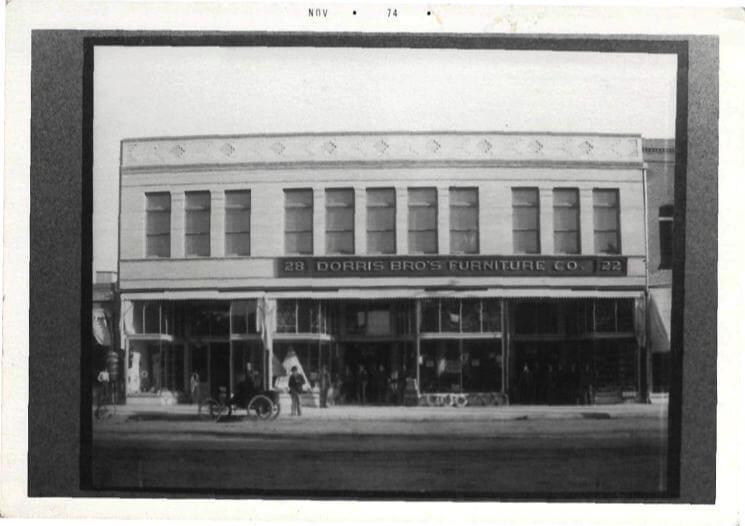

With the purchasing of the Dorris-Heyman Building, Will owned the largest building in Arizona. Drake owned and operated the largest furnishings house in
the territory in that same building. The family’s businesses grew to the point that they became the wealthiest family in Arizona.
Arizona became the 48th state on February 14, 1912. John Jaquemart after years of study of the Dorris Family concluded that they had more influence and were the most active in the acquisition of statehood for Arizona than any other single group there.
Will did by his Kilmichael sweetheart of his youth as he had promised before heading west. He promised Sarah Wilson, the daughter of the prominent Jack Wilson family of Kilmichael that he would return, marry, and take her west when he had established himself sufficiently to support her. Will traveled back to Kilmichael and married Sarah on September 16, 1887. She went with him and according to family lore they never visited back to Mississippi. That did not mean that there was no correspondence. They always sent nice Christmas and High School graduation gifts. He sent this writer a $25.00 check at his Kilmichael High School graduation in 1942.
These Dorrises were historically Gauls who migrated to Greece. In Greece they took the famous Greek name “Doric”. Continuing in their quest for religious freedom they migrated to Ireland. There they anglicized the name to Dorris. Their coming to America was also in the interest of religious freedom. The move to Arizona from Mississippi was not an extremely remarkable thing for members of this family. There are two items that show that good Central Mississippi and family values went with them. My bet is that the motto adopted by the state of Arizona reflects those very values. Their official motto is Ditat Deus (God Enriches). The other item of values is the fact that Arizona and Mississippi remained the only two alcohol dry states in the union for decades after other states had gone wet.
Joseph Mitchell Dorris donated the land and took the lead in building the first one-room school in the country south of Kilmichael. It was located at the top of the hill on the Poplar Creek Road diagonally across and a bit south of the old Burdette Greenlee home. It operated until the Nations School began operating in its new location in the late 1920’s. Joseph Mitchell pushed education. His abiding faith in the God of Heaven and education for his offspring were the driving forces in his life.
As a Phoenix pioneer, he was buried away from his beloved Jane, in the first and prominent corner of the Rosedale Cemetery, the oldest and first cemetery near the center of Phoenix. He died there on February 2, 1904. The city maintains the cemetery as a monument to its pioneers of which Joseph Mitchell is considered the first and foremost. His offspring populated much of Mississippi and Arizona.
This was written by Roy C. Watson, a great-grandson of Joseph Mitchell Dorris, at Jackson, Mississippi on August 17, 1997 from oral family stories and files of Dorris Family Records and Newspaper clippings collected over the years. A couple of facts were taken from the “History of Montgomery County, Mississippi” book by Evelyn Bell Crouch, Project Director and Editor, Curtis Media Corporation, 1993.